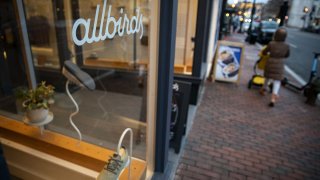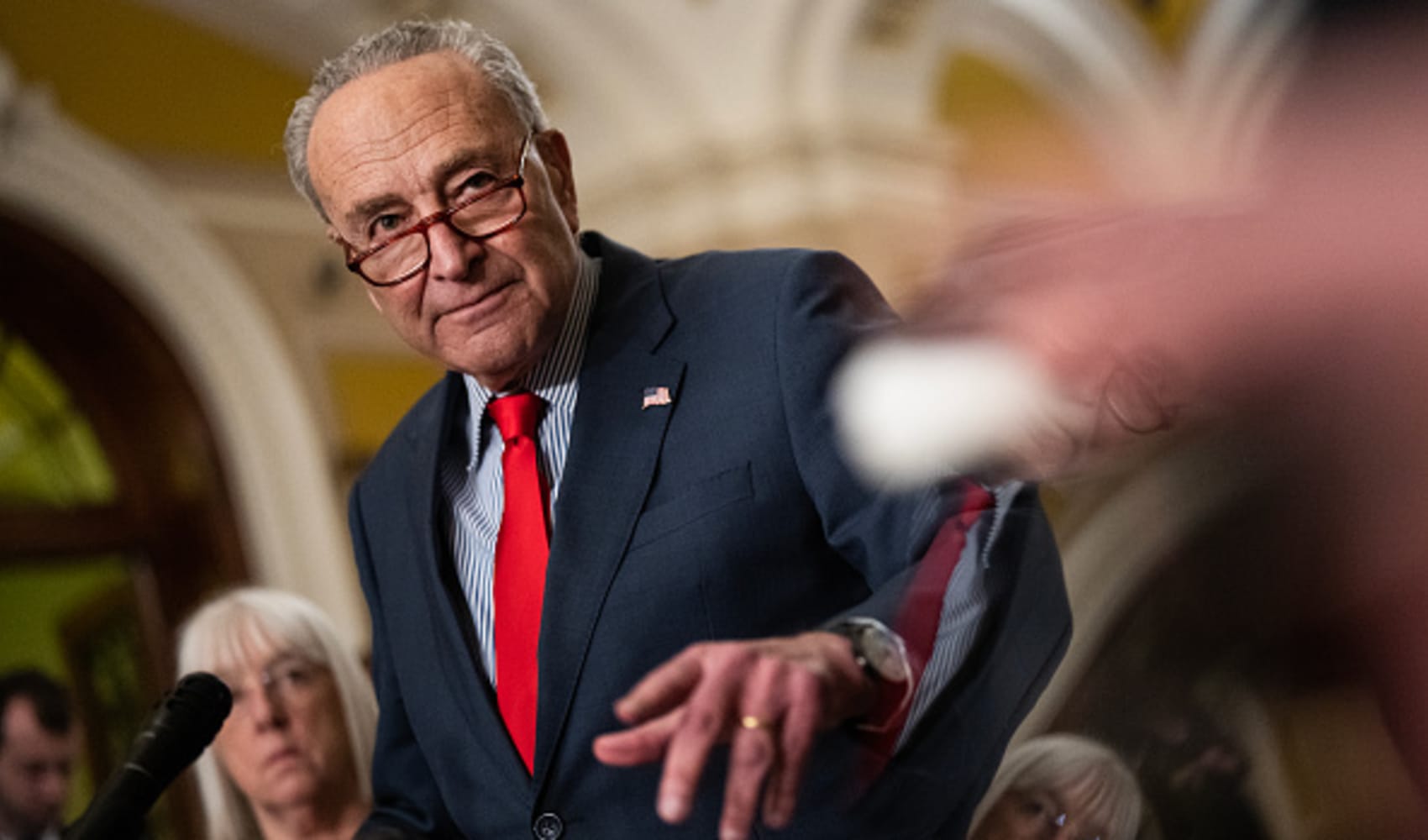
- Allbirds, which reports its first earnings as a public company on Tuesday, has looked to set itself apart from other companies in the sneaker and apparel space like Adidas, Nike and Lululemon through its heavy focus on environmentally friendly products and business practices.
- As more money is flowing into ESG-focused investments, Wall Street analysts appear to be bullish on the stock, expecting further growth as more consumers make sustainability part of their purchase decisions.
- The environment was ranked as the most important political and social issue by teens in Fall 2021 according to the Piper Sandler "Taking Stock With Teens" survey.
Allbirds has focused on its use of natural, environmentally friendly materials to set itself apart in the sneaker space from long-standing brands like Adidas, Nike and New Balance.
Putting ESG efforts at the core of its business has also caught the eye of Wall Street ahead of Allbirds reporting financial results for its first time as a public company after the market close on Tuesday.
Allbirds, which initially priced its 20.2 million shares at $15 to raise roughly $303 million in an offering early in November, saw a massive surge on its first day of trading, closing up nearly 91% at $28.64. However, the stock has slid since, declining more than 34% as of yesterday's close.
Get South Florida local news, weather forecasts and entertainment stories to your inbox. Sign up for NBC South Florida newsletters.
But the growing appeal of sustainable companies to both investors and consumers has left many analysts bullish. More money has flowed into funds and stocks that have an ESG focus — $3 out of every $10 going into global equities is being directed into ESG, according to Bank of America. The environment was ranked as the most important political and social issue by teens in Fall 2021, according to the Piper Sandler "Taking Stock With Teens" survey, signaling potential Allbirds buyers in the future.
ESG as a differentiator
"Allbirds' focus on sustainability will be a key differentiator both from a consumer and investor perspective," Bank of America analysts wrote. "The uniqueness of sourcing sustainable materials (i.e. wool, tree, sugar cane) helps Allbirds stand out relative to peers and will likely continue to increase as consumers incorporate higher sustainability standards into products they buy. The other advantage is centered on the amount of investing dollars that continues to shift into ESG funds."
Money Report
BofA put a buy rating and a $23 price target on the stock.
Allbirds shares were trading under-$19 on Tuesday.
Piper Sandler noted that the company's "strict commitment to sustainability is a key differentiator vs peers and will create tens of millions of loyal consumers over time."
"To that end, BIRD plays into several structural investment themes including: consumers shifting towards a direct relationship with brands, an acceleration of casual & athletic product and increasingly relevant ESG conversation for consumers & investors alike," Piper Sandler analysts wrote, placing a buy rating and a $26 price target on the stock.
Stifel analysts wrote that a proprietary survey of more than 11,000 consumers across six countries showed "broad market agreement" around the trend towards the "appreciation of sustainability" as well as the "casualization of fashion," areas it says are in "the brand's ethos."
"Allbirds has uniquely aligned its brand and operations with megatrends that are likely to drive consumer spending for the foreseeable future," Stifel analysts wrote. "The leadership position in bringing sustainable materials to market at scale has earned credibility with conscious consumers and the suppliers and potential partners across the value chain."
Stifel placed a buy rating on the stock with a 12-month target price of $25.
The challenges of staying sustainable
Some analysts noted the challenge of keeping that sustainability crown in a highly competitive sneaker and apparel market, especially as the company starts to compete more in the performance space.
"There is a threat from larger incumbent players such as Nike & Adidas investing heavily in similar natural & sustainable materials commercialization capabilities, noting BIRD does not maintain patents on the materials or design, which could impact Allbirds' competitive positioning," Baird analysts wrote.
In 2020, Allbirds and Adidas partnered to create performance running shoes that have no carbon footprint. Approximately 10,000 pairs have been released so far, with a larger release planned for the spring/summer season in 2022.
Allbirds launched its first running shoe, the Tree Dasher, in 2020, and released a running apparel collection this summer.
"Allbirds is making a concerted effort to expand into performance athletic and apparel," Telsey Advisory Group analysts wrote. "The athletic footwear industry is competitive with well-established players Nike and Adidas having a significant share of the market at 39% and 19%, respectively, in 2020. In addition, there are a number of fast-growing brands, including On and Hoka, catering to a similar consumer as Allbirds."
There also comes the challenge of maintaining that commitment to ESG practices.
Cowen analysts wrote that as sustainable practices are not yet at scale in the footwear industry, it "often carries a higher 'cost of doing business' to source materials that meet the company's sustainability requirements in the near term until availability and adoption become more mainstream." They also warned that there could be "reputational risk if BIRD is not able to meet ESG standards."
Stifel also pointed out the reputation risk when it comes to ESG practices.
"The foundation of the Allbirds brand is its reputation for positive environmental stewardship. With this the brand needs to be beyond reproach," Stifel analysts wrote. "Any environmental missteps or overstatement of environmental claims would receive considerable attention in the press and on social media likely impacting brand reputation and demand for Allbirds products."
Initially, Allbirds said it had planned to go public in what it called the "first sustainable public equity offering," or SPO. In its first S-1 filing to the SEC in August, it outlined a framework created in consultation with outside groups that would establish a variety of environmental, sustainability and governance standards that it would have to meet.
But Allbirds removed or weakened the language around the framework in subsequent editions of its prospectus, including deleting a line that other companies could also follow the SPO framework. Allbirds CFO Mike Bufano told the Financial Times that the company had received feedback from the SEC that prompted the changes.
Securities and Exchange Commission Chairman Gary Gensler has stated multiple times that the agency is evaluating several things related to ESG, including launching a climate and ESG enforcement task force.
"Further, I've asked staff to consider potential requirements for companies that have made forward-looking climate commitments, or that have significant operations in jurisdictions with national requirements to achieve specific, climate-related targets," Gensler said in June.
But the focus on ESG is only expected to grow for consumers and investors, presenting a significant opportunity for companies like Allbirds to further their commitments.
"You see regulators planning actions, analysts asking ESG questions on quarterly calls, shareholders raising the topic at annual general meetings – these are all things that were once niche but have taken hold," Aron Cramer, the president and CEO of Business for Social Responsibility, told CNBC. "Paying close attention to ESG as an essential element of business strategy has grown very substantially."






